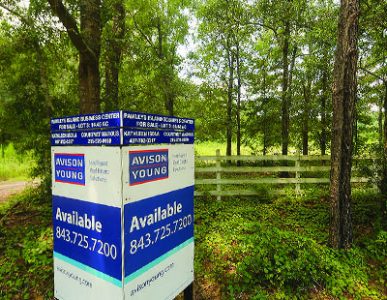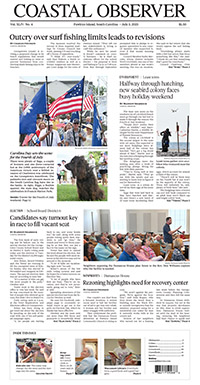Land use
Judge’s ruling stresses role of comprehensive plan as ‘guideline’ for decisions

No one challenged the decision of the Georgetown County Planning Commission to recommend against a zoning change that would allow 90 townhouses on land proposed for a tech park. The 5-1 decision last fall was based on the conflict between the zoning and the county’s land use plan.
That decision “would, on its own likely be considered arbitrary, and would constitute an abuse of discretion on the part of the Planning Commission,” according to a Circuit Court judge.
What was challenged in a lawsuit filed by neighbors and citizens groups was County Council’s decision to approve the zoning change. Judge William Seals dismissed the suit in April. Last week, he issued a formal ruling.
The complaint, he said, “fails as a matter of law in its quest to invalidate the zoning ordinances. In addition, the law greatly limits the power of the judicial branch to invalidate ordinances. The Court cannot (and will not) substitute its judgment for that of the legislative body of Georgetown County. Plaintiffs quite clearly disagree with the political decisions made by Georgetown County Council as it relates to zoning decisions.”
The suit is one of four filed over the course of 12 months by Keep It Green Advocacy on behalf of area residents who opposed the county’s land use decisions. It was the first to come before a judge on a motion by the county to dismiss. A similar motion in another case was scheduled to be heard last week, but was postponed at the last minute.
Cindy Person, chief counsel for Keep It Green Advocacy, said she plans to file a motion to alter and amend the judge’s order.
“To say we are shocked by this court order dismissing a thoroughly researched and well drafted complaint that was vetted by a team of experienced litigation attorneys and planning experts would be an understatement,” she said.
The 14.4 acres is owned by the county’s nonprofit Alliance for Economic Development, which planned to create a tech park to piggyback on the expansion of Mercom, an IT firm. When that failed to materialize, the county received offers to sell the land for residential development. A proposal for 182 apartments was withdrawn in 2021 in the face of community opposition.
The alliance received another offer from an unnamed buyer last year to build 90 townhouses. Area residents said it would increase traffic, stormwater runoff and the gentrification of the predominantly African-American community in Parkersville. After County Council voted to approve the change to the “planned development” zoning, several sued along with the groups Keep It Green, Preserve Murrells Inlet and the Parkersville Planning and Development Alliance.
In dismissing the suit, Seals said even accepting the allegations in the suit to be true they do not lead to a claim for relief. The ordinances that amend the zoning and the future land use maps for the property can only be invalidated, as the plaintiffs request, “after finding that the ordinances violated constitutional rights.” There was no such allegation in the complaint, he said.
That is among the issues Person plans to raise in her motion.
“There are constitutional deprivations alleged. We have a whole laundry list of them,” she said.
At the heart of the suit, Seals said, is “the misguided assertion that the Comprehensive Plan acts as a binding standard that the County must follow when approving land use decisions.”
“This Court finds that a county’s comprehensive plan exists to supply guiding principles in a county’s zoning and land use decisions, but it is not, by itself, an authoritative standard which must be strictly construed and applied,” he continued.
State law, the courts and “established practices of the counties” have confirmed the role of the comprehensive plan, the judge said. The land use element– and its future land use maps – is one of 10 elements that local governments must include in their comprehensive plans.
“In sum, the Comprehensive plan is not the law; it is a guideline,” Seals concluded.
He also rejected claims that the original tech park planned development was invalid because it did not include a mix of residential and commercial uses, that it should have reverted to its former zoning when construction failed to start within two years and that the 2022 amendment failed to follow the comprehensive plan.
“Moreover, Plaintiffs’ reading of the Planning Act is far too narrow,” Seals said, referring to state law. “In creating planned development districts, the General Assembly granted flexibility to local governments in making zoning decisions. Georgetown County applied the flexibility of the Planning Act to create and amend the Mercom PD.”
Person expects to appeal the judge’s ruling, calling the dismissal “highly unusua.”
While she noted the judge’s references to the comprehensive plan, Person said the basis of the complaint is not that the county didn’t follow the plan, but that it didn’t follow state law. “That’s the real cause of action,” she said.
The ruling by Seals found its way into a filing by the attorney representing a developer who plans to build 12 duplex units in the Parkersville area. The county’s approval of that project is also being challenged in court by Keep It Green Advocacy on behalf of neighbors and the three citizens groups. James Gilliam, the attorney for the Alliance for Economic Development also represents Covington Homes.
“Simply put, like the sister KIG Lawsuit Judge Seals recently dismissed, Plaintiffs in this case do not state any claims upon which this Court can grant relief and the case should be dismissed,” Gilliam wrote in a filing the day after the judge issued his order.
That case also hinges in part on the role of the future land use maps contained in the comprehensive plan. The duplex site is shown as medium density, but the “general residential zoning district allows high density.”
“Because allowing the Comprehensive Plan to overrule a validly-enacted county ordinance would be an absurd result, the Court cannot provide the relief Plaintiffs seek,” Gilliam said. “And if there were any doubt, Judge Seals made this same determination just one month ago.”
In a filing last week, Person said that unlike the tech park suit, the challenge to the duplexes did not “involve a presumption of legislative validity.”
The county, Person said, “unlike most other counties in South Carolina, has zoning ordinances on its books that predate the enactment of the Planning Act. To the extent that these ordinances conflict with state law, they are void. This is one of several matters to be determined in this lawsuit.”
A hearing on motions from the county and Covington Homes to dismiss the suit was postponed until July.




